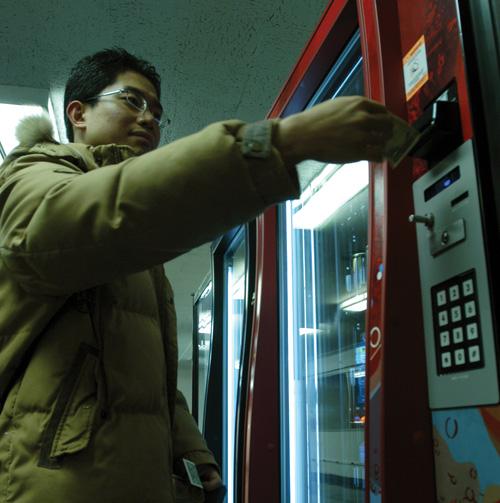Soft-drink proposal could affect UI

Dongwoon Kwak, 28-year-old architecture graduate student, buys soda from a vending machine in the basement of the Illini Union on Tuesday, January 16, 2007. Roxana Ryan
Jan 19, 2007
Last updated on May 12, 2016 at 07:08 a.m.
The state of Illinois Department of Revenue is in the process of taking bids for the right to become the sole supplier of soft-drink vending machines at many state facilities and events, including the University campus.
Mike Klemens, spokesman for the Department of Revenue, said the supplier would be responsible for stocking and maintaining about 2.400 soft-drink vending machines at state offices, four university campuses and interstate rest stops.
“The question was, can we find a vendor interested in serving all these machines and will they pay the state for the right to do that,” he said.
Similar programs have been successful in New York City and Houston, producing 60 million and 5 to 6 million dollars respectively, Klemens said.
Get The Daily Illini in your inbox!
However, it is difficult to estimate how much revenue the contract could generate for the state until bids are placed and the state can begin to analyze them, Klemens said.
The proposed contract will apply to all three University of Illinois campuses in Chicago, Springfield and Urbana, and will also apply to Northeastern Illinois University in Chicago.
If the contract were put in place, Klemens said it will save state agencies time and money by eliminating their dealings with vending suppliers on an individual level.
Tom Hardy, executive director of University relations, said the University plans to maintain its current contract with Coca-Cola until its expiration.
Hardy said that the current contract ensured that the revenue from the vending services is returned to the campus, but discussions concerning where revenue will go under the proposed contract have not yet begun, he said.
Klemens said that three or four companies have expressed interest in placing a bid for the contract.
“Over the course of developing this, officials have tried to tailor the program so that the beverage industry would be interested in it,” he said.
Klemens said he believes fans of both Pepsi and Coca-Cola can be made happy through the proposed contract.
“I don’t think that it has to be ‘either or’,” he said. “There is some chance we’d have a vendor that would do both, but we don’t know until we see the proposal.”
There are details to be worked out, but the proposed contract could help the state and its universities, Klemens said.
“This can allow us to make more money, which can then be used to reduce tuition or be put into various other programs,” he said.





